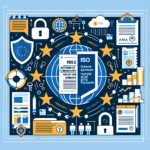

## NIS2: The New Frontier of Cybersecurity in Europe
The NIS2 Directive is marking a significant change in the landscape of cybersecurity within the European Union. Its introduction represents a step forward from the previous NIS Directive, setting stricter goals and greater commitments from organizations to enhance the protection of their networks and information systems. In this article, we will explore the details of this directive and how relevant ISO standards can help companies achieve and maintain compliance, thereby ensuring information security and customer trust.
### Objectives of NIS2
NIS2 includes key requirements aimed primarily at improving cybersecurity in Europe. These objectives include:
– **Adoption of Adequate Security Measures**: Organizations must implement specific controls to protect their operations and data.
– **Timely Notification of Significant Incidents**: In the event of an attack or breach, it is essential for companies to promptly report incidents to the relevant authorities to enable an effective response.
– **Risk Assessment and Management**: The approach to security must be proactive, with ongoing analysis of potential risks and vulnerabilities within information systems.
### ISO Standards for Compliance with NIS2
To support organizations in their transition to NIS2 compliance, various ISO standards provide a practical and strategic framework. The most relevant standards are listed below:
#### ISO/IEC 27001
This standard forms the basis for creating an Information Security Management System (ISMS). Implementing an ISMS enables companies to effectively identify and manage risks associated with information security. Moreover, certification according to ISO/IEC 27001 demonstrates a strong commitment to security, a crucial element for adhering to NIS2.
#### ISO/IEC 27002
This standard provides practical guidelines on how to implement adequate security controls and recommendations for managing various aspects of cybersecurity. By adopting the practices outlined in this standard, organizations can enhance their operational security, preparing effective responses to the requirements of NIS2.
#### ISO/IEC 27005
Risk management is at the core of cybersecurity, and the ISO/IEC 27005 standard provides essential guidelines for identifying and mitigating risks associated with information security. The risk-focused approach emphasized by NIS2 finds a solid foundation in the practices recommended by this standard.
#### ISO/IEC 27701
Extending the ISO/IEC 27001 and 27002 standards, this standard focuses on privacy management. In a context where the protection of personal data is increasingly concerning, adherence to ISO/IEC 27701 not only enhances compliance with NIS2 but also provides tools to meet data protection regulations like the GDPR.
#### ISO 22301
Essential for operational continuity management, ISO 22301 ensures that organizations can continue to operate even in the presence of security incidents. Adopting a structured approach to continuity is crucial to minimize downtime and ensure business resilience, aligning with the objectives set by NIS2.
#### ISO/IEC 27017
With the growing adoption of cloud computing, ISO/IEC 27017 plays an important role in protecting information in cloud environments. It provides specific guidelines for security controls, addressing shared responsibilities between providers and customers. Following this standard is essential for tackling the unique risks associated with cloud services.
#### ISO/IEC 27018
This standard…


